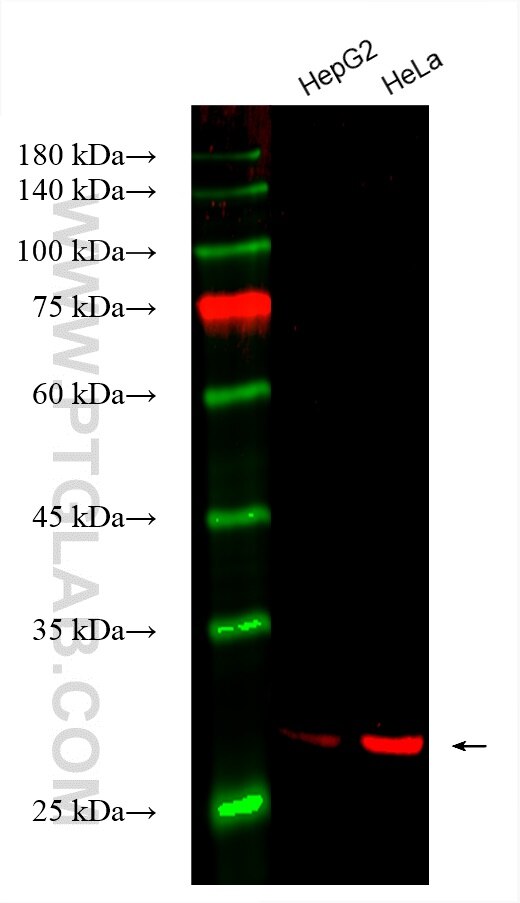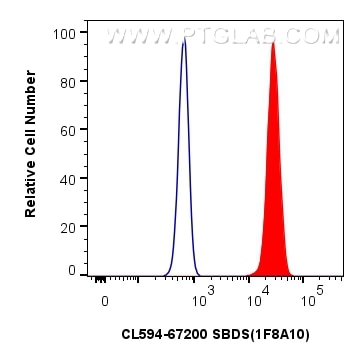- Phare
- Validé par KD/KO
Anticorps Monoclonal anti-SBDS
SBDS Monoclonal Antibody for WB, FC (Intra)
Hôte / Isotype
Mouse / IgG2a
Réactivité testée
Humain, rat, souris
Applications
WB, FC (Intra)
Conjugaison
CoraLite®594 Fluorescent Dye
CloneNo.
1F8A10
N° de cat : CL594-67200
Synonymes
Galerie de données de validation
Applications testées
| Résultats positifs en WB | cellules HepG2, cellules HeLa |
| Résultats positifs en FC (Intra) | cellules HeLa, |
Dilution recommandée
| Application | Dilution |
|---|---|
| Western Blot (WB) | WB : 1:500-1:2000 |
| Flow Cytometry (FC) (INTRA) | FC (INTRA) : 0.40 ug per 10^6 cells in a 100 µl suspension |
| It is recommended that this reagent should be titrated in each testing system to obtain optimal results. | |
| Sample-dependent, check data in validation data gallery | |
Informations sur le produit
CL594-67200 cible SBDS dans les applications de WB, FC (Intra) et montre une réactivité avec des échantillons Humain, rat, souris
| Réactivité | Humain, rat, souris |
| Hôte / Isotype | Mouse / IgG2a |
| Clonalité | Monoclonal |
| Type | Anticorps |
| Immunogène | SBDS Protéine recombinante Ag11731 |
| Nom complet | Shwachman-Bodian-Diamond syndrome |
| Masse moléculaire calculée | 250 aa, 29 kDa |
| Poids moléculaire observé | 29-31 kDa |
| Numéro d’acquisition GenBank | BC065700 |
| Symbole du gène | SBDS |
| Identification du gène (NCBI) | 51119 |
| Conjugaison | CoraLite®594 Fluorescent Dye |
| Excitation/Emission maxima wavelengths | 588 nm / 604 nm |
| Forme | Liquide |
| Méthode de purification | Purification par protéine A |
| Tampon de stockage | PBS with 50% glycerol, 0.05% Proclin300, 0.5% BSA |
| Conditions de stockage | Stocker à -20 °C. Éviter toute exposition à la lumière. Stable pendant un an après l'expédition. L'aliquotage n'est pas nécessaire pour le stockage à -20oC Les 20ul contiennent 0,1% de BSA. |
Informations générales
Shwachman-Bodian-Diamond syndrome (SBDS) is a member of a highly conserved protein family that exists from archaea to vertebrates and plants. The protein may function in RNA metabolism. Mutations within its gene are associated with Shwachman-Bodian-Diamond syndrome.This gene encodes a member of a highly conserved protein family that exists from archaea to vertebrates and plants. The encoded protein may function in RNA metabolism. Mutations within this gene are associated with Shwachman-Bodian-Diamond syndrome. An alternative transcript has been described, but its biological nature has not been determined. This gene has a closely linked pseudogene that is distally located.
Protocole
| Product Specific Protocols | |
|---|---|
| WB protocol for CL594 SBDS antibody CL594-67200 | Download protocol |
| FC protocol for CL594 SBDS antibody CL594-67200 | Download protocol |
| Standard Protocols | |
|---|---|
| Click here to view our Standard Protocols |



